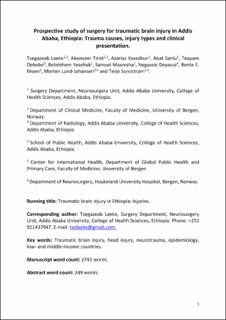| dc.contributor.author | Teklemariam, Tsegazeab Laeke | |
| dc.contributor.author | Aklilu, Abenezer Tirsit | |
| dc.contributor.author | Kassahun, Azarias | |
| dc.contributor.author | Sahlu, Abat | |
| dc.contributor.author | Debebe, Tequam | |
| dc.contributor.author | Yesehak, Betelehem | |
| dc.contributor.author | Masresha, Samuel | |
| dc.contributor.author | Deyassa, Negussie | |
| dc.contributor.author | Moen, Bente Elisabeth | |
| dc.contributor.author | Lund-Johansen, Morten | |
| dc.contributor.author | Sundstrøm, Terje | |
| dc.date.accessioned | 2022-03-24T12:46:10Z | |
| dc.date.available | 2022-03-24T12:46:10Z | |
| dc.date.created | 2021-10-18T13:57:33Z | |
| dc.date.issued | 2021 | |
| dc.identifier.issn | 1878-8750 | |
| dc.identifier.uri | https://hdl.handle.net/11250/2987384 | |
| dc.description.abstract | Background
Traumatic brain injury (TBI) is a public health problem in Ethiopia. More knowledge about the epidemiology and neurosurgical management of TBI patients is needed to identify possible focus areas for quality improvement and preventive efforts.
Methods
This prospective cross-sectional study (2012–2016) was performed at the 4 teaching hospitals in Addis Ababa, Ethiopia. All surgically treated TBI patients were included, and data on clinical presentation, injury types, and trauma causes were collected.
Results
We included 1087 patients (mean age 29 years; 8.7% females; 17.1% <18 years old). Only 15.5% of TBIs were classified as severe (Glasgow Coma Scale score 3–8). Depressed skull fracture (44.9%) and epidural hematoma (39%) were the most frequent injuries. Very few patients had polytrauma (3.1%). Assault was the most common injury mechanism (69.9%) followed by road traffic accidents (15.8%) and falls (8.1%). More than 80% of patients came from within 200 km of the hospitals, but the median time to admission was 24 hours. Most assault victims (80.4%) were injured >50 km from the hospitals, whereas 46% of road traffic accident victims came from the urban area. Delayed admission was associated with higher Glasgow Coma Scale scores and nonsevere TBI (P < 0.01).
Conclusions
The injury panorama, delayed admission, and small number of operations performed for severe TBI are linked to a substantial patient selection bias both before and after hospital admission. Our results also suggest that there should be a geographical framework for tailored guidelines, preventive efforts, and development of prehospital and hospital services. | en_US |
| dc.language.iso | eng | en_US |
| dc.publisher | Elsevier | en_US |
| dc.rights | Attribution-NonCommercial-NoDerivatives 4.0 Internasjonal | * |
| dc.rights.uri | http://creativecommons.org/licenses/by-nc-nd/4.0/deed.no | * |
| dc.title | Prospective Study of Surgery for Traumatic Brain Injury in Addis Ababa, Ethiopia: Trauma Causes, Injury Types, and Clinical Presentation | en_US |
| dc.type | Journal article | en_US |
| dc.type | Peer reviewed | en_US |
| dc.description.version | acceptedVersion | en_US |
| dc.rights.holder | Copyright 2021 Elsevier | en_US |
| cristin.ispublished | true | |
| cristin.fulltext | postprint | |
| cristin.qualitycode | 1 | |
| dc.identifier.doi | 10.1016/j.wneu.2021.02.003 | |
| dc.identifier.cristin | 1946741 | |
| dc.source.journal | World Neurosurgery | en_US |
| dc.source.pagenumber | e460-e468 | en_US |
| dc.identifier.citation | World Neurosurgery. 2021, 149, e460-e468. | en_US |
| dc.source.volume | 149 | en_US |

